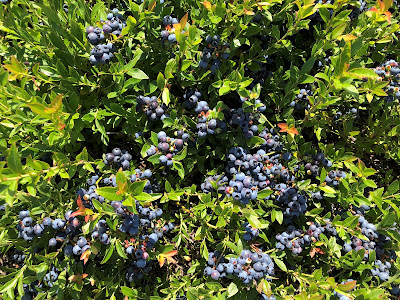This spring, ATTTA has been pleased to attend wild blueberry meetings across the Atlantic provinces. These meetings highlighted guest speakers and key industry members who presented on topics about the state of the industry and disseminated recent research findings around wild blueberries and production. Read on for an overview of the major themes that came out of these meetings and a glimpse into the outlook of Atlantic Canada’s wild blueberry industry.
The Blueberry Industry Goes Wild!
There were several themes that rang through the wild blueberry meetings held throughout New Brunswick (Moncton, Bleuets NB Blueberries), Nova Scotia (Truro, Wild Blueberry Producers Association of NS) and PEI (Charlottetown, PEI Wild Blueberry Producers Association) this spring. Theses provincial meeting also aligned with the discussions held at regional meeting in Tracadie, Pennfield and Parrsboro. Overall, there is a great positivity in the wild blueberry industry and also an understanding that the future will present some challenges.
In terms of research, Dr. Scott White reported on significant developments in weed management. There are proposed products in the pipeline, particularly for fescue. CHICARA® is a new group two herbicide that has proven effective and can be considered by producers as an alternate in their integrated pest management regime. There have also been technological advances in application techniques. Dr. David Percival and other researchers at Dalhousie are developing smart applicators which will improve the efficiency of herbicide use by training computers to detect the target vegetation and spray it directly as opposed to conventional widespread application.
There was a
sense of optimism and celebration at these meetings, as well! The wild
blueberry industry is in a position where good markets and prices for berries
are supportive of growth. The potential for expansion was discussed in all
provinces with New Brunswick seemingly very well placed for increased
capacity. Furthermore, recent research
has revealed positive news for wild blueberries from a consumer perspective. Health
research consultant, Dr. Wihelmina Kalt presented research that wild
blueberries have demonstrated to have an overall preferable flavor profile when
compared to high bush blueberries, for example in sweetness and consistency of
flavor. Not only this, blueberries have proven to hold exceptional health
value. Commonly praised for high antioxidant content, blueberries are perhaps
even more beneficial due to high concentrations of anthocyanins which help in mitigating
cardiovascular and neurological deterioration (Kalt
et al. 2019).
However,
with this encouraging potential for growth there is also concern. The common
concern through the industry appears to be around providing pollination units
to support expansion. There is worry around the high winter losses reported
throughout the country and the impact that this will have on our local wild
blueberry industry this season. There is also considerable discussion around
the future availability of pollination units as new fields come into
production.
The solution to this concern is not just increasing honey bee hives available for pollination but also, and importantly, to improve the efficiency of our available pollination units. This was the focus of ATTTA’s discussions at these meetings and has been featured in our most recent blog postings. By using appropriate stocking densities, hive placement, and hive strength, we can maximize the pollination capacity of honey bee hives that we currently have for wild blueberry pollination and strengthen our regional pollination industry.
Connecting with ATTTA Specialists

